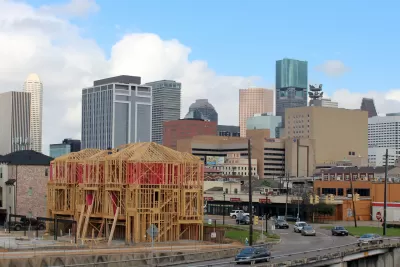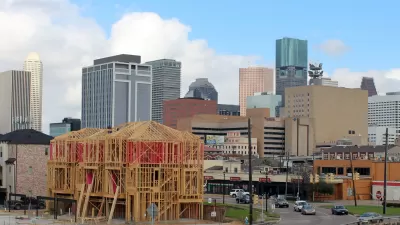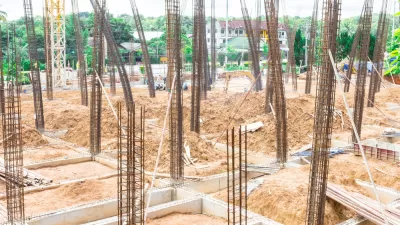With a multitude of new high-end apartment complexes coming online, Houston residents are reaping the rewards of lowered rents as landlords struggle to fill vacancies due to a slowing oil economy.

If there was ever a need for evidence that more housing units (even those at the high-end of the market) was good for renters, housing proponents can now point to Houston where a number of factors have combined to create a tenants market. Erin Mulvaney of the Houston Chronicle reports that the cooling oil economy in Houston has led to an oversupply of housing units, which in turn has left landlords sitting on empty units. The oversupply has created some unique opportunities for apartment hunters.
Austin Kroschel and Hayley Dippon feel like they are better off renting for now. They recently signed a lease for a new place before they tie the knot next month. The couple was pleased to see that rent for the complex on West Dallas Street dropped nearly $300 from when they were looking last spring.
During their search, they found leasing offices offering free months, waiving application fees and offering such incentives as free trash pickup. The couple came in under their projected budget with $1,350 a month for a one-bedroom apartment.
Developers are reacting to the changed market by scaling back on development, but at this stage they don’t foresee foreclosures on the horizon as happened during the Great Recession. Developers are holding out hope that higher end jobs in health care, hospitality and education will fill the gap left by the decline in employment in the oil industry.
FULL STORY: Growing consensus: Local apartment market 'overbuilt'

Study: Maui’s Plan to Convert Vacation Rentals to Long-Term Housing Could Cause Nearly $1 Billion Economic Loss
The plan would reduce visitor accommodation by 25,% resulting in 1,900 jobs lost.

North Texas Transit Leaders Tout Benefits of TOD for Growing Region
At a summit focused on transit-oriented development, policymakers discussed how North Texas’ expanded light rail system can serve as a tool for economic growth.

Why Should We Subsidize Public Transportation?
Many public transit agencies face financial stress due to rising costs, declining fare revenue, and declining subsidies. Transit advocates must provide a strong business case for increasing public transit funding.

How to Make US Trains Faster
Changes to boarding platforms and a switch to electric trains could improve U.S. passenger rail service without the added cost of high-speed rail.

Columbia’s Revitalized ‘Loop’ Is a Hub for Local Entrepreneurs
A focus on small businesses is helping a commercial corridor in Columbia, Missouri thrive.

Invasive Insect Threatens Minnesota’s Ash Forests
The Emerald Ash Borer is a rapidly spreading invasive pest threatening Minnesota’s ash trees, and homeowners are encouraged to plant diverse replacement species, avoid moving ash firewood, and monitor for signs of infestation.
Urban Design for Planners 1: Software Tools
This six-course series explores essential urban design concepts using open source software and equips planners with the tools they need to participate fully in the urban design process.
Planning for Universal Design
Learn the tools for implementing Universal Design in planning regulations.
Ascent Environmental
Borough of Carlisle
Institute for Housing and Urban Development Studies (IHS)
City of Grandview
Harvard GSD Executive Education
Toledo-Lucas County Plan Commissions
Salt Lake City
NYU Wagner Graduate School of Public Service





























